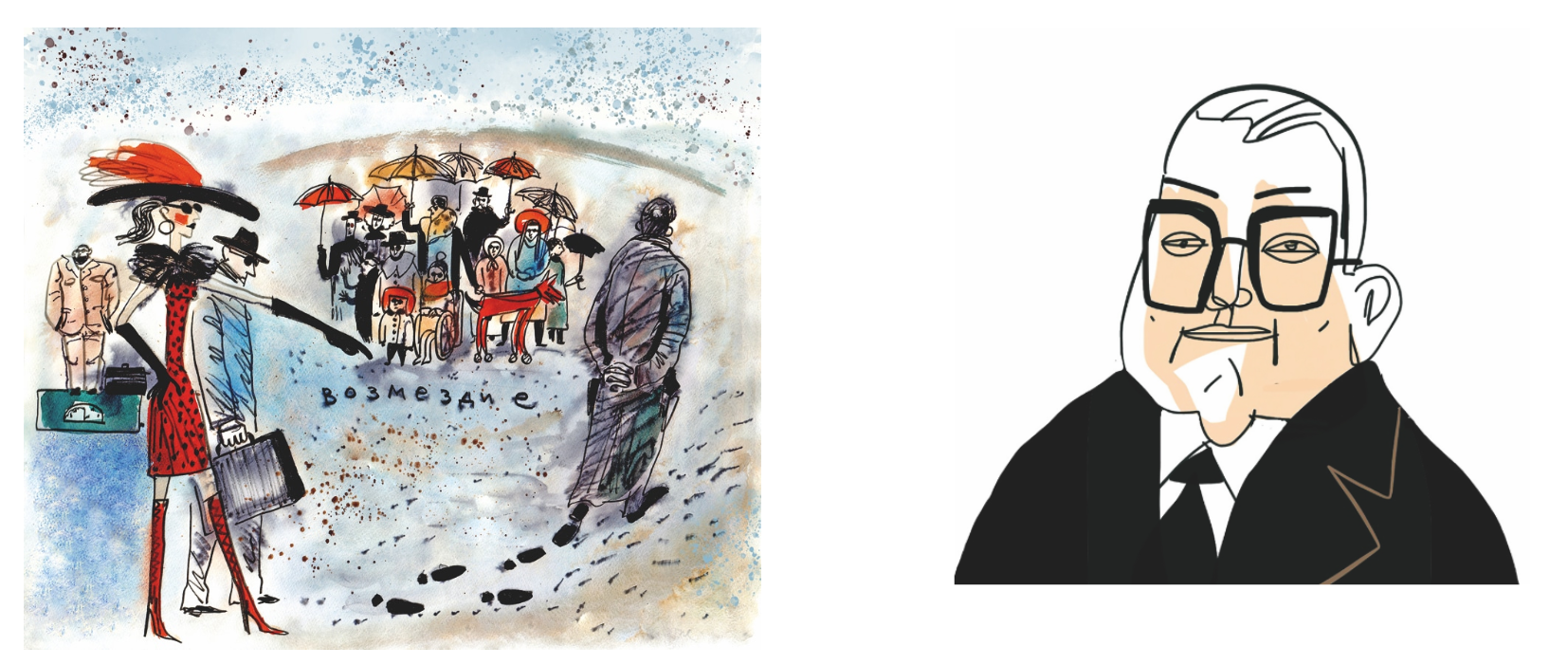"The Visit" (1956)

"The Visit" by Friedrich Dürrenmatt
"The Tragicomedy" by Swiss playwright Friedrich Dürrenmatt, "The Visit" (or "The Visit of the Old Lady"), became part of the repertoire of every major European theater within just a few seasons, and the author was awarded the Molière Prize. In the mid-1950s, Dürrenmatt worked on a novel "Lunar Eclipse"—a grim story of a "prodigal son" who, after half a century of wandering, returns to his native village to coldly take revenge on his rival. The work remained unfinished, but its dramatic plot became the basis for his new play.
A wealthy elderly woman, Clara Zachanassian, returns to her hometown. Her goal is not nostalgic walks or chatting about the past with friends from her youth but a meticulously planned revenge. Years ago, this town crushed the spirited soul of a young girl and destroyed her naive virtue. Clara’s primary target remains her former beloved man, the hypocritical Alfred Ill, who abandoned her when she was pregnant to marry advantageously, then slandered her in court. Clara had hoped he would acknowledge their child. But Ill denied paternity, bribing two witnesses with a liter of vodka to testify against her.
In Switzerland, marriage and family law—including the legal status of illegitimate children—is governed by Part 2 of the Civil Code. According to the legislation at the time, and pursuant to Article 307, a child conceived out of wedlock could only be legally recognized by the father through a court order. Pursuant to Articles 314 and 315, the burden of proof required either: a sworn admission of paternity by the alleged father, or evidence that the child’s mother had no sexual relations with other men.
The false witnesses claimed Clara had been intimate with them, leading the court to dismiss her case.
Condemned by puritanical society, a young woman is forced to leave town and embark on a path of moral disgrace to survive. Now the town is in decline, and an elderly billionaire offers the mayor a large sum to kill the despised Ill. In the end, the desperate townsfolk comply with the request and sentence him to death.
The plot follows a classic detective storyline, yet the play is allegorical and leans toward the ideas of the Theater of the absurd. Clara becomes a symbol of vengeance, Ill serves as a metaphor for the atonement of long-standing sins, and the townspeople embody the causes and consequences of modern society's moral decay.
At the heart of Dürrenmatt’s play lies the question of moral responsibility: Should betrayal by loved ones be forgiven? Is there any justification for the townspeople’s inhumane behavior? Must one person be sacrificed for the sake of public welfare? The playwright recognizes the naivety of condemning vice from the lofty heights of moral idealism. With horror, Dürrenmatt observes how ordinary people readily abandon morality when faced with pressing concerns. The author is far from certain that, in a moment of moral choice, any average person would be capable of acting differently. The townspeople’s moral downfall is not the result of inherent wickedness but rather stems from selfishness, pragmatism, and weak character.
The playwright finds societal conformism repulsive, while the inner strength, capacity for empathy, and self-doubt displayed by the protagonist evoke genuine admiration. Clara’s soul has been mutilated by life’s tragedies—a grotesque parallel to the prosthetic limbs that replace parts of her body after traumatic accidents. Under Article 259 of the Swiss Criminal Code, Clara Zachanassian’s actions could be classified as a public incitement to commit a crime. Yet the characters in The Visit inspire sorrow rather than anger. This is precisely why the main antagonist, Alfred Ill, ultimately embraces a sense of responsibility for his sins—an awareness that demands atonement and acceptance of punishment.
Signs and Symbols in the Illustration
Swiss Criminal Law in the First Half of the 20th Century